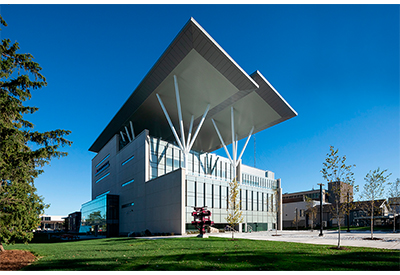Canada’s Zero Carbon Building Standard Celebrates First 10 Certifications

Nov 27, 2019
The Canada Green Building Council is helping Canada eliminate carbon emissions with ten projects certifying under its Zero Carbon Building (ZCB) Standard. These pioneering projects include new and existing offices, schools and warehouses, each demonstrating that buildings of all types and age can achieve zero carbon emissions.
Introduced two years ago, the ZCB Standard was designed to guide the industry in building to zero and help Canada meet its international emissions targets by 2030. Since its launch, CaGBC’s made-in-Canada standard has shifted the green building conversation to focus on carbon as its key performance metric. A carbon metric recognizes the true climatic impact of a building and brings to light aspects not considered by energy efficiency, including the importance of selecting low-carbon construction materials and energy sources for building operations. The market response has been encouraging, with over 20 projects (including 10 certifications) now registered under the ZCB Standard.
See CaGBC’s Zero Carbon Case Studies here
Achieving both Design and Performance certifications – a first
One of the first Zero Carbon pilot projects, The Joyce Centre for Partnership and Innovation at Mohawk College announced it is the first building to achieve both ZCB Design and Performance certifications. Design certification assures a project has been designed according to zero carbon building requirements while Performance certification demonstrates the project has achieved zero carbon emissions over one year of operation as required by annual verification.
The Joyce Centre design reflects a strong focus on zero-carbon, with an innovative high-performance building envelope that minimizes heating and cooling demand, an all-electric geoexchange system, and a striking rooftop photovoltaic (PV) system.
The careful, integrated design and construction process paid off and building operations have demonstrated better-than-expected performance – enabling the project to achieve ZCB-Performance certification.
“The Joyce Centre is a beautiful and functional example of what a sustainable learning space can offer. We are proud to provide our students, and the community, with a successful model of climate action at work while setting a new benchmark for green building operations in Canada,” said Mohawk College President Ron McKerlie. “This Canada Green Building Council Performance certification confirms that we have been operating The Joyce Centre effectively and that we are meeting the goals we set out in the building’s design.”
“Zero carbon buildings, like The Joyce Centre at Mohawk College, represent a great opportunity for cost-effective emissions reduction. These projects spur innovation in design, building materials and technology while creating new skills and expertise for tradespeople and professionals,” said Thomas Mueller, President and CEO, CaGBC and CEO, GBCI Canada. “Owners are also recognizing the benefits a zero-carbon building can bring, including increased resiliency to extreme weather events, meeting occupant expectations for comfort and corporate leadership, and future-proofing against rising carbon costs.”
Zero Carbon Showcase
The CaGBC is showcasing the ten ZCB-certified buildings at cagbc.org. There you can view videos of early pilot projects, review new case studies, and read CaGBC research demonstrating both the technical viability and financial feasibility of the standard.
The CaGBC will also be sharing updates to the ZCB Standard early in 2020, as they release ZCB v2 to the market. Updates will include feedback from the ZCB pilot projects, and will feature more stringent requirements for energy use and embodied carbon.

















